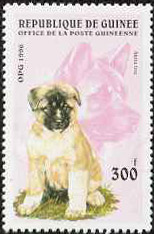
Dachshunds for Dummies
Dachshunds are sometimes classed as hounds, and were also used as earth dogs in Germany, where they originated, so they have much in common with terriers. Different types of dachshunds have been developed, with smooth, long, or wiry coats, and standard or miniature sizes. All types of dachshund tend to be bold and independent dogs - they are hunting dogs, so like to take decisions for themselves - and they also tend to bond closely with their owners.
Dachshunds are very keen on being lap dogs, and can be very pushy about getting attention from their owners. They tend to prefer one person, but will happily accept attention and adoration from others in the household. They can be strong-willed, but respond well to food treats, and, because they like attention, one way of controlling their behaviour is to reward them for desirable behaviour with cuddles and praise, withdrawing your attention briefly if they do things you would rather they didn't. It's important to be consistent with dachshund pups, and teach them how you want them to behave when they are adults, since they are such strong-willed dogs. Don't let their cuteness distract you, or laugh and reward them for being mischievous!
Dachshunds not taught bite inhibition as pups can be very nippy as adults. Spoilt dachshunds can be quite tyrannical with their owners, constantly demanding to be picked up or otherwise attended to, and being very noisy. A well-trained dachshund can be a very loyal companion. It was a Dachshund who saved a Swedish hunter's life when the hunter was attacked by a bear. The Dachshund bit the bear's testicles!
This breed is best appreciated by people who recognise both the benefits and drawbacks of a small, strong-willed breed which can also be a 'velcro dog'. Like all dogs, Dachshunds benefit from a daily walk, but they don't need to go very far to be happy, and they don't usually pull your arm off, so they are very suited to older people with experience of dogs, and who no longer feel they have the physical strength for larger, stronger breeds.
Well-socialized Dachshunds usually get on well with children, though they need some protection from smaller children who might handle them roughly and damage their backs. They also usually get on well with other dogs, so long as they have been well-socialized. Owners need to socialize dachshund pups carefully, without being too protective. They do best with playmates who are not too rough, because of their relatively fragile backs. Dachshunds can more than hold their own when it comes to telling larger breeds to back off, but some young puppies of the bouncier breeds, like Boxers, don't always get the message that other dogs don't like rough play.
Dachshunds can be very barky, which is fine if you want a watchdog, but otherwise you may need to use some form of bark control, and keep them away from stimuli that provoke barking, like windows that allow them to see passers by and their dogs. Owners may notice that their dachshunds like to dig, like many 'earth dogs', and that they like to roll in fox poo. Normally, dachshunds are fairly clean, but fox poo is difficult to get rid of and tends to smell even after a bath, so you will need to have a good dog shampoo ready for emergency use.
Dachshunds are also among the more difficult breeds where early housetraining is concerned, though at least they are small dogs, so their accidents can more easily be cleaned up. Accidents are also more likely to happen as they age, so an easy-clean floor covering is a good idea for an aged family dachshund. They shouldn't really be allowed to sleep on the bed, both because of the risk to their backs from jumping off a high bed, and because if they do become unreliable about housetraining, or just plain incontinent, they may have to be banished from your bed, and will suffer more than if they had never been allowed on the bed. You can give them their own bed in your bedroom, with a covering to protect your floor.
Dachshunds are prone to back trouble, and you need to be careful of letting them do things that might injure their backs, such as rushing up and down stairs fast or jumping in general. They should be picked up with care, so their backs aren't jarred, and held with their backs horizontal. Repel any dog that tries to mount your dachshund in play, their backs don't easily take the strain of larger dogs mounting them. They should also have a strict check kept on their weight, since obese dachshunds are more likely to develop back trouble. Bladder and urinary tract problems, heart disease and diabetes have also been reported as fairly common. Despite their back problems being common, Dachshunds are generally healthy and long-lived.
This guide gives a detailed exploration of dachshunds' history and character, as well as offering a lot of help with general care, including health care. It is detailed enough to interest experienced owners of the breed, as well as new dachshund owners.



